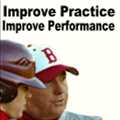Baseball Instruction - Is it Just Your Imagination?
By Nate Barnett
Have you even been up to bat or on the mound and wanted to hide? Just maybe crawl under the plate, or peel back the pitching
rubber and slip underneath for a bit and let someone else deal with the situation?
I'm laughing while I'm writing this because I can't tell you how many times those thoughts had occurred to me while playing
through college and professionally. But, for every one of those quick moments of despair, confusion, uncertainty, or dread,
I've had dozens of high quality confident thoughts. And that is the key. The ratio of high quality to low quality thoughts
needs to be significantly greater.
So, if you are working with an athlete (or 13 of them) who struggles with confidence on the field, take some of these words
to heart and reach out and include these ideas in your baseball instruction.
An athlete can only have two different kinds of thoughts while playing the game, high quality and low quality. Here are
the definitions of each.
High quality thoughts: These are positive forward thinking thoughts that are meant to build the confidence of the athlete.
High quality thoughts remain in the present tense (while in a performance) and help an athlete rise to a challenge. For example,
"I will hit (present tense) this pitcher for a double in the gap", or "There is no chance this batter hits me now (present
tense)".
Low quality thoughts: These thoughts are negative in nature and do nothing to help an athlete succeed. The more the
player is struggling, the more prevalent low quality thoughts are. Low quality thinking lives in the past or the future tense.
They are disease ridden and can affect a performance tremendously. Examples include, "I hope I don't strike out (future tense)",
or "I really can't believe I walked that guy (past tense)."
Now that you have an awareness of the two types of thinking in an athletes' mind, the question is how to add it into your
baseball instruction.
Try these couple suggestions during practice (or games).
1. Prevent your athletes (or your son if you're a parent) from speaking anything negative about his game. Negative talk
can be directed towards oneself, others, the game, the length of practice, conditioning, or a myriad of any other situations
or things. Preventing this type of low quality conversation will reduce the amount of time the mind will choose to access
negativity in uncomfortable situations.
2. Use focus points. I've written more in depth on this in other pieces, but the short of it is when the mind is fully
focused on any given thing, there is no ability for any other thought to pass through the mind. Therefore, train hitters or
pitchers to focus their attention onto a part of the plate or a piece of the glove (for pitchers) just before they retrain
the focus back to the pitcher, or hitter. This brief moment of 100% focus will dismiss any poor thinking occurring within
the athlete. Focus will then be retrained back on the task at hand without low quality thinking.
About the Author
Nate Barnett is owner of BMI Baseball http://bmibaseball.com and is based out of Washington State. His expertise is in
the area of hitting, pitching, and mental training. Coach Barnett's passion is working with youth in helping expand their
vision for their baseball future. After finishing a professional career in the Seattle Mariners Organization, Nate pursued
his coaching and motivational training career. His instructional blog is located at http://bmibaseball.com/blog
His new FREE ebook, Toxic Baseball: Are you polluting your game? can be found on the main BMI Baseball website.
Hitting 101, an ebook on complete hitting mechanics will be released by June 1st, 2008. Features include numerous illustrations,
video clips, and a special offer to discuss your hitting questions over live on the phone strategy sessions.

